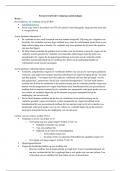Tentamen (uitwerkingen)
ESC3701 Assignment 2 2023
- Vak
- Instelling
QUESTION 1 Functionalism is one of the major theories in Sociology of education. Provide a brief explanation of what Sociology of education as discipline entails. (10) QUESTION 2 The works of Emile Durkheim focus on how social order is possible and how society can remain stable despite the many inf...
[Meer zien]













